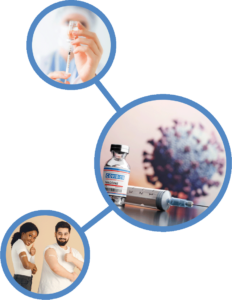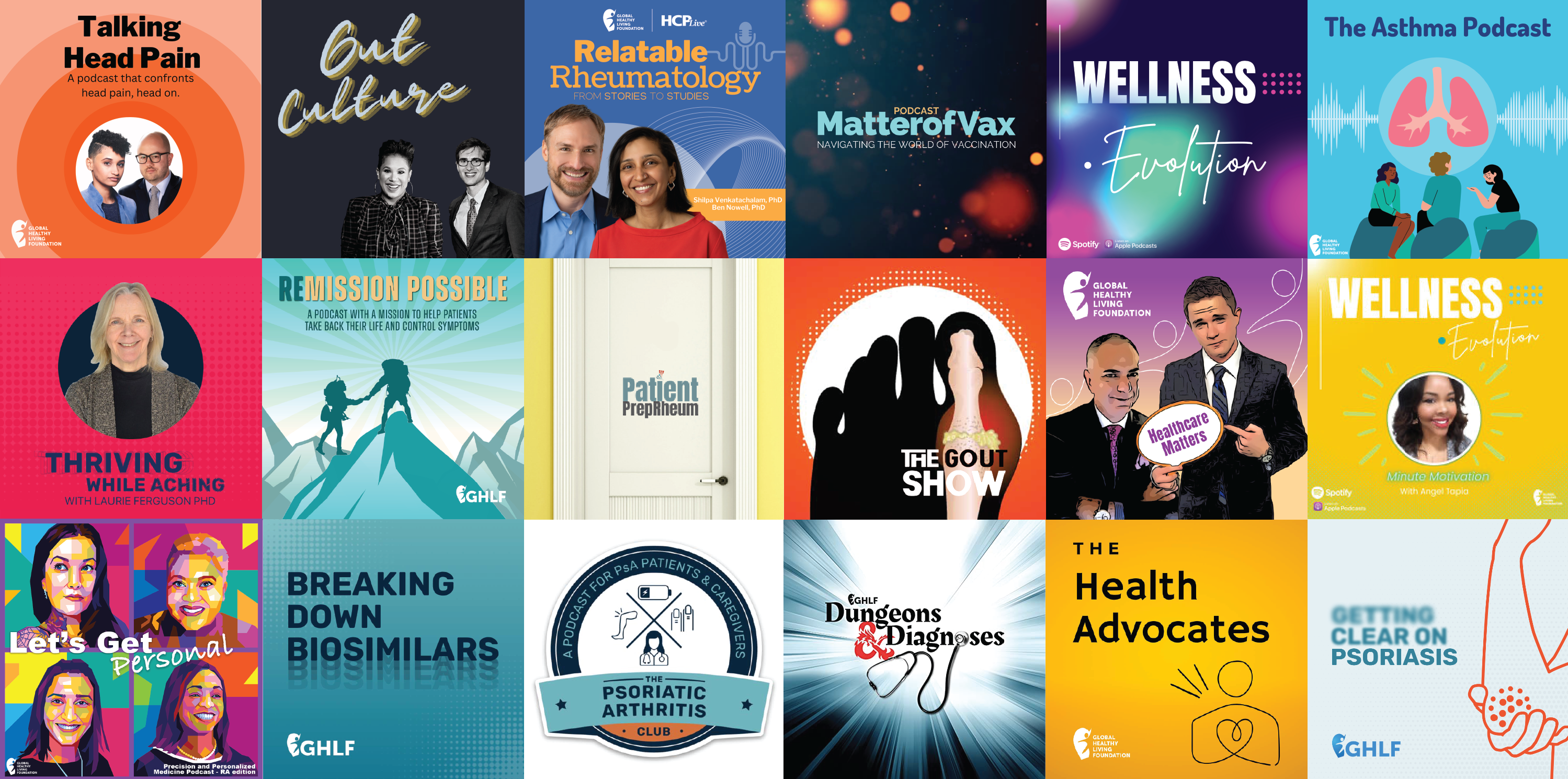INFORMED IMMUNITY
A GUIDE TO VACCINES FOR THE CHRONIC ILLNESS COMMUNITY
Get ready to revolutionize your understanding of vaccines and community health! This eye-opening podcast series will tackle the most pressing topics in the realm of vaccines, from debunking myths to advocating for public health.
Our hosts make it their mission to translate medical jargon into bite-sized, actionable insights. Whether you’ve been curious about the latest vaccine developments or are just looking for credible health advice, “Informed Immunity” has got you covered.
Informed Immunity is presented by Wellness Evolution.
LISTEN TO OUR EPISODES
You can check out our Informed Immunity series below or wherever you listen to podcasts. Be sure to subscribe for access to future episodes and email us at [email protected] with any feedback or questions.
Episode 1:
Demystifying Vaccines
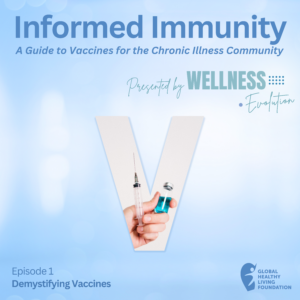
Ever wondered how vaccines actually work? Or maybe you’ve heard rumors linking vaccines to autism or fertility issues?
In our inaugural episode, Dr. Hernandez and Angel Tapia clear the air, separating fact from fiction. From the mechanics of vaccines to the science behind boosters, this episode is your ultimate guide to making informed health decisions. Tune in now and become a vaccine myth-buster!

Episode 1 - Demystifying Vaccines
Narrator 00:00
Be inspired, supported, and empowered. This is the Global Healthy Living Foundation Podcast Network.
Angel Tapia 00:11
Welcome to Informed Immunity, a wellness evolution podcast in which we tackle the crucial topics that impact community health, respiratory infectious diseases, vaccine advocacy, and more. I’m Angel Tapia, your guide into the world of community health and a senior manager of Hispanic Community Outreach at the Global Healthy Living Foundation. Joining me is my colleague, Dr. Daniel Hernandez, Director of Medical Affairs and Hispanic Outreach. Together, we’re here to break down complex health topics into easily understandable insights, answering the questions you’ve always had about vaccines and more. In this episode, we will discuss the topic of demystifying vaccines. Thank you, Daniel, for joining us today.
Dr. Daniel Hernandez 00:56
It’s a pleasure to be here to discuss a topic of great importance, vaccines and more importantly, vaccine advocacy.
Angel Tapia 01:03
I’m so glad we’re having this conversation especially because according to the CDC, vaccine misinformation is growing and it’s causing real damage. A 2022 study found that misinformation on social media may be contributing to vaccine hesitancy and reduced vaccine uptake. Why is it important to learn more about vaccines even if you’re not vaccine hesitant?
Dr. Daniel Hernandez 01:26
Great question. It’s important because the more you know, the better off you are in demystifying myths around you. Vaccines are one of the most important public health interventions in history, they have saved millions of lives and prevented countless cases of serious illness. So we’re here today to dispel those myths, the myths that have been going around on social media and maybe even around your social network in-person. And we’re here to provide evidence based information about the importance and safety of vaccines, what we want to do is we want to empower people to make informed decisions about their health, and also the health of their loved ones. So whether you’re a parent who’s wondering if vaccines are safe for your child, or an adult who’s questioning whether you need to get vaccinated against COVID-19, or someone that wants to speak to a family member and try to bring evidence based information to them. We hope this podcast will give you the information you need to make the best decision for yourself and for your family.
Angel Tapia 02:29
Well, let’s get right into it and talk about the common myths and dispel them. There seems to be a significant discussion around mRNA vaccines and whether they interact with our DNA. Could you clarify this?
Dr. Daniel Hernandez 02:41
Yeah, absolutely. It’s a common misconception. But the truth is mRNA, what it does is that it serves as a set of instructions for cells. That’s it. So it directs them to create proteins. They work by delivering a piece of mRNA code, it instructs the body cell to produce a protein and in the COVID-19 case, it produces a protein that resembles the virus. And this protein then triggers the immune system to produce antibodies that can protect against the infection in the long term. It’s separate from DNA, it doesn’t integrate into it. And the mRNA once it tells the body cells, the protein to produce, it disintegrates after its function. And it’s done.
Angel Tapia 03:26
Thank you, Daniel, that was very informative. And now what can you tell us about the long term side effects of vaccines? Some people are concerned about what might happen years down the line?
Dr. Daniel Hernandez 03:37
That’s also a very valid question. It’s something very important to keep in mind that vaccines undergo rigorous testing for both short term and long term effects. Most side effects, if they do occur, are manifested shortly after the vaccination, usually mild, unless it’s an allergic reaction, but there’s no credible evidence to suggest serious long term effects that are attributable to vaccines. It’s also important to note that once the vaccine is out in the public, it’s not like it ends the testing. The monitoring of these vaccines are constant by governmental bodies, not only in the United States, but around the world. So if there is a side effect, a serious side effect, especially it would be addressed immediately.
Angel Tapia 04:24
So moving on to another topic that has captured public attention the supposed link between vaccines and autism. What does the science say?
Dr. Daniel Hernandez 04:33
So not completely not true. The claim linking vaccines to autism has been discredited time and time again. Numerous studies have been done and there is no association between vaccines and autism. Here’s a bit of a summary. So in 2019, a study found from 100 different studies, that there’s no evidence of a link between the MMR vaccine and autism. A 2020 study in the Journal of Pediatrics found that children who received the MMR vaccine were no more likely to develop autism than children who did not receive the vaccine. I mean, these children that did not receive the vaccine were highly susceptible to getting measles, mumps, or rubella. And these diseases without the vaccine are extremely dangerous for the child. The claim that vaccines cause autism was actually made in 1998. And it was published medical journal that was retracted afterward. And the reason why it was retracted other than there was no scientific evidence to support the study was that the author Andrew Wakefield had falsified the data. And the reason why is because he had financial ties to a lawyer who was suing vaccine manufacturers. So the lawyer wanted to have something that was backing the claim and partnered with Andrew Wakefield, a scientist at the time and falsified this data. Unfortunately, despite the overwhelming scientific evidence that vaccines do not cause autism, some people continue to believe this myth. This has led to a decline in vaccination rates, which has in turn led to outbreaks of preventable diseases such as measles and mumps, it’s important to remember that vaccines are safe and effective. They are one of the most important public health interventions of all time. So getting vaccinated is the best way to protect yourself and your loved ones from serious diseases.
Angel Tapia 06:39
Thank you so much for that detailed and informative explanation, Daniel. It is important to remember that vaccines are safe and effective, and that they are the best way to protect ourselves and our loved ones from serious diseases. Now, some argue that the natural immunity is sufficient protection, what are your thoughts?
Dr. Daniel Hernandez 06:58
Well, so natural immunity basically means not being vaccinated. Natural immunity does provide some level of protection. So if you get the virus, you will have some sort of level of protection, but it’s often not as robust or long lasting as vaccine induced immunity. Vaccines are more reliable to safeguard against these diseases, because it basically means that you’re not getting infected in order for you to produce an immune response. Also, vaccines are designed to target specific parts of the pathogen of the virus. This allows the immune system to develop a more targeted and effective response, they also expose your immune system to a smaller amount of the virus. If that’s the mechanism of action of the vaccine, many times you’re not exposed to any of the virus like in COVID-19 mRNA vaccinations, and this is a lot more ideal, obviously, then, this natural immunity and even though you’re exposed to the pathogen this way, or not exposed at all, it’s enough to stimulate a strong immune response without causing the disease. So natural immunity can also be detrimental to a number of people, especially those depending on their age and health of the individual and also the strain of the pathogen. So for example, people who experience mild or asymptomatic infections may not develop a strong immune response, and those who are infected and have a chronic illness or are older than the age of 65. Without this protection can have catastrophic effects on their body. Collectively, the evidence indicates that vaccine induced immunity is a more reliable and potent mode of protecting oneself from diseases than natural immunity. So to put things into perspective, here’s an analogy. Imagine you’re building a house to shield yourself from the elements from rain and from hurricanes and all these different natural disasters that can happen. Opting for natural materials like sticks and mud might not be the best choice as they lack durability and offer meager protection against severe weather conditions. Conversely, synthetic materials like concrete and steel are renowned for their strength and durability make a better choice. Vaccines are to the immune system with synthetic materials or to house building. They are faster and more robust and lasting immune response compared to natural immunity.
Angel Tapia 09:38
Thank you for sharing that analogy. It’s clear that vaccines are the best way to protect ourselves from disease both in the short and long term. Another prevalent myth that the flu vaccine can give you the flu. Can you share more on this considering that there are different types of flu vaccines available?
Dr. Daniel Hernandez 09:55
Sure. So all flu vaccines have quadrivalent protection, which basically means that they protect against a variety of strains of the flu. Flu vaccine cannot give you the flu. That is just a fact, this is because the vaccine contains inactivated, which has killed flu viruses, or a very weakened type of virus. So these can’t replicate and cause illness, and they’re not strong enough to cause illness in healthy people. That’s the reason why you also have to speak to your physician about what is the best vaccine for you. So what essentially happens when you get the flu shot is that you’re teaching your body how to fight against influenza virus, the influenza virus is pretty sneaky, and that it mutates itself. And that’s why we hear about the different strains of the flu. And what it does is that it mutates itself that sometimes our body doesn’t know how to protect itself simply because the mutation has been pretty intense, so that it can still affect us. And that’s the reason why we get a quadrivalent vaccine. So we have a line of protection. And hopefully, one of the strains that we’ve identified is the strain that you are being infected again. So that’s a long way to say that sometimes we will get the flu virus, we will get infected by the flu, and we won’t have the resources within our body to fight it off simply because of these mutations. But many times the majority of the time, we do have the safeguards, and we do have the protection within our body if we have been vaccinated because we’ve trained our body how to deal with the flu virus.
Angel Tapia 11:39
So the bottom line is that vaccines are safe and effective to help protect ourselves and our loved ones from the flu.
Dr. Daniel Hernandez 11:47
That’s great.
Angel Tapia 11:47
Lastly, let’s discuss a concern related to COVID-19 vaccine specifically regarding fertility. Um, can you provide some insights on those concerns?
Dr. Daniel Hernandez 11:57
Sure. So during the pandemic, that’s something that we heard from some initial studies, but after more studies and long term studies, there is no scientific evidence to suggest that COVID-19 vaccines impact fertility in men or women. Some studies that we can cite is in the journal Vaccine, in 2022, there was a study that found no association between COVID-19 vaccination and fertility impairment in women or in men, there was also a metaanalysis of eight pre-post studies. So basically an analysis of many different studies that found that the same sperm concentration in men were found if they were vaccinated or not for the COVID-19 virus. And there’s many, many more. So there is one little thing that has been found in it’s that some women, females may experience temporary changes in their menstrual cycle after receiving the COVID-19 vaccine. However, these changes are usually mild and resolve on their own within a few months. Overall, the evidence suggests that COVID-19 vaccines are safe and effective for people of all reproductive ages. In fact, getting vaccinated against COVID-19 is one of the best things you can do to protect your fertility and your overall health.
Angel Tapia 13:19
Thank you for shedding light on that concern. It is important to remember that the benefits of getting vaccinated against COVID-19 far outweigh any potential risks, especially when it comes to fertility. And thank you so much for this informative discussion, Daniel, it’s crucial to dispel these myths and provide the evidence based information.
Dr. Daniel Hernandez 13:39
I agree Angel, it’s our responsibility to make well informed health decisions based on credible sources.
Angel Tapia 13:45
Before we go, I think it would be important for us to have a refresher on what vaccines actually are. So my first question is how do vaccines work?
Dr. Daniel Hernandez 13:55
Vaccines teach your body how to produce antibodies against the virus you’re being vaccinated for. This helps protect you from infection in the short term. Vaccines also help train other immune cells known as B cells and T cells. T cells recognize when a pathogen enters the body and attacks infected cells, and B cells produce antibodies that directly interact with the pathogen to neutralize they have something like a memory that allows them to identify and respond every time a given pathogen enters the body.
Angel Tapia 14:28
And can you tell us what role boosters play in immunity?
Dr. Daniel Hernandez 14:32
Boosters or additional doses of any vaccine provoke an immune response and further strengthen your immune system, both in the short term and the long term. That is why doses are spaced apart. They help reactivate and strengthen the immune response for the short term and also the long term.
Angel Tapia 14:51
And can you shed some light on why some people do have side effects?
Dr. Daniel Hernandez 14:56
Sure. So vaccines induce an immune response because they in Introduce sometimes a part of the virus, but also sometimes just a little bit of an instruction of how to fight this virus. It is a bit of a virus, it’s not enough to fully infect you with a disease. But many people might have some side effects in response to the vaccine, because the immune system is learning how to fight it off, and it is finding it off in a very minor way. So the most important thing to remember is that the vaccine cannot give you the disease you’re being vaccinated against, you might get some pain and redness at the injection site. So fatigue, fever, headache, but these should go away in a few days. If they haven’t gotten in a few days, it’s very important to speak to your physician. And also something to note is if you get a vaccine, you should stay in the clinic or wherever you’re getting your vaccination on site for around 15 minutes afterwards, just in case of an allergic reaction. Allergic reactions are very rare, but it’s important to make sure that you’re not one of the people that are allergic to a specific vaccine. And if you are, you’re in the right place in order for the correct intervention to happen quickly.
Angel Tapia 16:12
Thank you for all of this information, Daniel, it never hurts to have a refresher and remind ourselves of the importance of our vaccines. And for more information, listeners can visit the CDC or WHO websites for more evidence based information. Thank you for tuning in. And until next time, stay informed and stay healthy. Thank you for joining us on this episode of Informed Immunity, a wellness evolution podcast. We hope our discussions inspire meaningful conversations with your loved ones. For our Spanish speaking listeners. Episodes are also available and espanol, if you have any questions or topics you’d like us to address, email us at [email protected] and you can find all of GHLF’s podcasts at ghlf.org/listen. If you like this podcast, give us a rating and write a review on Apple podcasts and subscribe to us wherever you listen. It’ll help more people like you find us. I’m Angel Tapia,
Dr. Daniel Hernandez 17:15
and I’m Dr. Daniel Hernandez,
Angel Tapia 17:17
Until next time, stay informed and stay safe.
Narrator 17:21
Be inspired, supported, and empowered. This is the Global Healthy Living Foundation Podcast Network.
Episode 2:
All About Vaccines for Chronic Illness Patients – Influenza and Pneumonia Vaccine Information
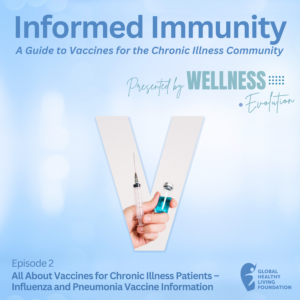
If you’re managing a chronic illness, you won’t want to miss this episode. We delve into the world of influenza and pneumococcal vaccines, revealing their crucial role in protecting those with chronic conditions.
Learn what the CDC has to say, and why these vaccines are more significant than you might think. Hit play and get the knowledge you need to stay healthy year-round!

Episode 2 - All About Vaccines for Chronic Illness Patients –Influenza and Pneumonia vaccine information
Narrator 00:00
Be inspired, supported, and empowered. This is the Global Healthy Living Foundation Podcast Network.
Angel Tapia 00:11
Welcome to Informed Immunity, a wellness evolution podcast in which we tackle the crucial topics that impact community health, respiratory infectious diseases, vaccine advocacy, and more. I’m Angel Tapia, your guide into the world of community health and a Senior Manager of Hispanic Community Outreach at the Global Healthy Living Foundation. Joining me is my colleague, Dr. Daniel Hernandez, Director of Medical Affairs and Hispanic Outreach. Together, we’re here to break down complex health topics into easily understandable insights, answering the questions you’ve always had about vaccines and more. In this episode, we will be tackling the information around influenza and pneumonia vaccines and why they are important. Thank you, Daniel, for joining us today.
Dr. Daniel Hernandez 00:58
Thank you for having me, Angel. Today we’re focusing on a crucial subject, vaccines for individuals dealing with chronic illness and as Angel mentioned, it’s around influenza and pneumonia. This is a very important topic for those listeners. We’ve received many questions about this. So I’m very happy to talk about this today.
Angel Tapia 01:17
So let’s jump into more specific vaccines. We’ll begin by discussing influenza vaccines a pertinent topic as flu season approaches. Daniel, could you give us an overview of the main types of flu vaccines, and their importance?
Dr. Daniel Hernandez 01:31
Sure. So there’s different flu vaccine manufacturers and multiple flu vaccines that are licensed and recommended for use here in the United States. All of them are quadrivalent, which basically means that they are a vaccine that trains your immune system on a number of mutations or strains from the flu virus. The reason for this is because the flu likes to mutate likes to change up its composition quite often. And we don’t know what type of strain is going to be kind of the one in season this year. So the best way to prevent us from getting the flu and not having the tools within our body to fight this is we get the multiple strain type of vaccine. There are many flu vaccine options, as I mentioned, but the most important thing is for all people six months and older to get a flu vaccine every year. If you have questions about which vaccine is best for you, it’s very important to talk to your doctor or other health care professional and more information on the approved flu vaccines for the current flu season. And what type of person should be receiving a very specific type of flu vaccine is available in the CDC website, so go to cdc.org and you can find more information about that.
Angel Tapia 02:54
Thank you very much for that comprehensive, detail, Daniel, it’s very helpful to understand some of those risks. And when we talk about the flu vaccine and how it interacts with chronic conditions, can you share a little bit more detail on that?
Dr. Daniel Hernandez 03:07
Sure. So as I mentioned, the flu is not a minor issue, especially for those with chronic conditions. If you have a chronic condition, it means that your immune system is already low. So if you get infected by the influenza virus, it’s more likely that you will present with severe complications such as pneumonia or other respiratory infections. Therefore, if you get the vaccine, you are more likely to have the tools within your body to fight this off. So by getting vaccines, these individuals not only decrease their likelihood of getting the flu, but also reduce the severity if they do contract it.
Angel Tapia 03:44
And could you elaborate a bit of how these vaccines also bolster overall immunity?
Dr. Daniel Hernandez 03:50
Sure. So a flu vaccine essentially teaches the immune system how to recognize and fight the flu virus. This is invaluable for those whose immune systems may already be compromised due to chronic conditions.
Angel Tapia 04:03
So moving on, I want to touch on another critical topic pneumococcal vaccines. This is more than just a difficult word to pronounce. But it is crucial for public health, correct?
Dr. Daniel Hernandez 04:14
Definitely. pneumococcal disease is a serious concern because it can manifest in many ways from pneumonia, as we had mentioned also with the flu to meningitis and bloodstream infections, it’s an issue that can affect individuals across the age spectrum from infants to the elderly. So it’s very important to educate yourself on this pneumococcal vaccine.
Angel Tapia 04:36
So I understand that now, prevention is better than a cure. So what are the preventative measures available?
Dr. Daniel Hernandez 04:44
Right. So prevention is key. And that’s where pneumococcal vaccines come into play. They act as a line of defense against this multifaceted disease, as I said, especially for those in the higher risk categories. So the severe effects if we are infected can be mitigated can be diminished by these vaccines. That’s why it’s so important. And that’s why we’re speaking about that today.
Angel Tapia 05:08
So age is a factor here. So do different age groups have different requirements?
Dr. Daniel Hernandez 05:14
Yes, age is a factor. That’s why the CDC recommends the flu vaccine for those six months and older, infants under the age of five, and adults who are 65 or older are at higher risk. There’s study after study that has shown this. So there are specific vaccination schedules tailored to these age groups. And it’s very important to speak to your doctor about these vaccine schedules in order for you to make sure that you are up to date.
Angel Tapia 05:40
And what about people with pre-existing conditions? Does the vaccine interact with other health issues?
Dr. Daniel Hernandez 05:46
If someone is already managing a chronic condition like asthma or heart disease, getting the pneumococcal vaccine offers an added layer of protection it’s not going to affect you, but it’s actually going to help you It minimizes the risk of a bad situation getting worse due to an infection such as pneumococcal infection.
Angel Tapia 06:05
Very good to know. Are there any contradictions for this vaccine?
Dr. Daniel Hernandez 06:09
Sure. So not everyone is a candidate for the pneumococcal vaccine, those with severe allergies to any component of the vaccine should avoid it. And that’s a conversation that you should have with your physician. As well as if someone is currently dealing with a severe illness. It’s better to recover fully before getting vaccinated. But that is a conversation that you should be having with your physician.
Angel Tapia 06:31
Those are very good points. So to sum it up, if you fall within the higher risk category, or even if you’re outside of those groups, you should consult your health care provider about getting the pneumococcal vaccine.
Dr. Daniel Hernandez 06:44
Exactly, in the realm of preventative health, which is what we’re talking about today. Basically, the pneumococcal vaccine is a worthwhile consideration for many, it’s always best to consult, obviously, with your health care provider to make sure that you are getting personalized advice, which is very important, but just a few points that I’d like to add. It’s that pneumococcal vaccines are very safe and effective. They’ve been shown to reduce the risk of serious pneumococcal infections by up to 90%. Pneumococcal vaccines are recommended for children younger than five years old, and people with certain medical conditions, and adults 65 years old and older.
Angel Tapia 07:24
Thank you so much for sharing all of these details Daniel and for shedding light on this very important topic. To our listeners. Remember that prevention is an essential part of maintaining good health. So do not overlook this vaccine. So before we go, Daniel, as in each episode, why don’t we offer our listeners a refresher on vaccines, a vaccine 101, so to speak. So let’s first start with what are vaccines.
Dr. Daniel Hernandez 07:50
That’s a great idea. So vaccines teach your body how to produce antibodies against the virus you are being vaccinated for this helps protect you from infection in the short term. They basically help train other immune cells known as B cells and T cells to recognize a virus and attack it. B cells produce antibodies that directly interact with the pathogen when it comes in, and it neutralizes it. B and T cells have something like a memory that allows them to identify and they respond every time a given pathogen enters the body.
Angel Tapia 08:24
Thank you so much for that detail. Can you also tell us what role boosters play in our immunity?
Dr. Daniel Hernandez 08:30
Sure. So you hear a lot about boosters, especially recently, we’ve been hearing about COVID-19 boosters are these are basically additional doses of any vaccine. And what this does is that it provokes an immune response. And it further strengthens your immune system, both in the short term and the long term. That’s why these doses are spaced apart to reactivate and strengthen the immune response.
Angel Tapia 08:54
So when we talk about responses, can we also talk about why we might get side effects?
Dr. Daniel Hernandez 08:59
Sure. So usually, most people don’t get side effects. And what happens is, the reaction itself is a little tiny portion sometimes of the pathogen. And other times it’s not even that it’s just the injection itself can cause redness and pain at the injection site. But it also can create while your immune system is learning, it can create a bit of fatigue, fever, headache, nausea, and these are signs that the body is building protection against the virus. However, obviously, you should contact a doctor if your side effects feel severe, or they don’t go away after a few days, and everyone receiving a vaccine should be monitored on site. So wherever you get your vaccine should stay there for around 15 minutes afterward, just in case of an allergic reaction. They’re very rare, but it’s important to be there just in case.
Angel Tapia 09:52
Thank you so much for this refresher, Daniel. I think it helps bring all of this information together and center it so that we can make sure we pay attention to our vaccine health, and for more information, listeners can visit the CDC or WHO websites for more evidence based information. Thank you for tuning in. And until next time, stay informed and stay healthy. Thank you for joining us on this episode of Informed Immunity, a wellness evolution podcast. We hope our discussions inspire meaningful conversations with your loved ones. For Spanish speaking listeners episodes are also available in Espanol. If you have any questions or topics you’d like us to address, email us at [email protected] and you can find all of GHLF’s podcasts at ghlf.org/listen, if you like this podcast, give us a rating and write a review on Apple podcasts and subscribe to us wherever you listen. It’ll help more people like you find us. I’m Angel Tapia,
Dr. Daniel Hernandez 10:57
and I’m Dr. Daniel Hernandez,
Angel Tapia 10:59
Until next time, stay informed and stay safe.
Narrator 11:04
Be inspired, supported, and empowered. This is the Global Healthy Living Foundation Podcast Network.
Episode 3:
All About Vaccines for Chronic Illness Patients – RSV and COVID-19 Vaccine Information
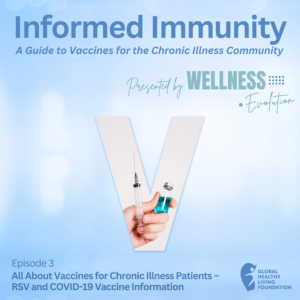
In this must-listen-to episode, we dissect the critical role of RSV vaccines in averting severe complications for those with chronic illnesses. We also address what’s new in the 2023–2024 COVID-19 vaccine guidelines, tailored for various age brackets and those with compromised immune systems.
Tune in and take control of your health today!

Episode 3 - All About Vaccines for Chronic Illness Patients – RSV and COVID-19 vaccine information
Narrator 00:00
Be inspired, supported, and empowered. This is the Global Healthy Living Foundation Podcast Network.
Angel Tapia 00:11
Welcome to Informed Immunity, a wellness evolution podcast in which we tackle the crucial topics that impact community health, respiratory infectious diseases, vaccine advocacy, and more. I’m Angel Tapia, your guide into the world of community health and a Senior Manager of Hispanic Community Outreach at the Global Healthy Living Foundation. Joining me is my colleague, Dr. Daniel Hernandez, Director of Medical Affairs and Hispanic Outreach. Together, we’re here to break down complex health topics into easily understandable insights, answering the questions you’ve always had about vaccines, and more. In this episode, we will be tackling the information around RSV and COVID-19 vaccines and why they are important. Thank you, Daniel, for joining us today.
Dr. Daniel Hernandez 00:59
Thank you for having me, Angel.
Angel Tapia 01:00
Daniel, could you dive into the significance of RSV vaccination for this demographic?
Dr. Daniel Hernandez 01:05
Of course, so RSV, or respiratory syncytial virus is often underestimated. The reason why is because usually it causes a mild cold-like symptom, but it can be quite severe for people with chronic conditions like asthma, heart disease, and COPD. Infants and older adults are more likely to develop severe RSV and actually need hospitalization. And that’s the reason why we’re talking about RSV vaccines today. So to emphasize the gravity of RSV in certain people, a study in the journal Chest found that asthmatic individuals hospitalized due to RSV infection had higher mortality rates during hospitalization compared to those who weren’t hospitalized for RSV. So basically, someone with asthma that had RSV and wasn’t vaccinated was more likely to die than someone who was hospitalized, that had RSV but didn’t have asthma. So that’s why it’s so important to get vaccinated if you fall under this group.
Angel Tapia 02:14
Thank you so much for highlighting the importance of RSV vaccination for people with chronic health conditions. This is a call to action for our listeners. If you have a chronic condition. Don’t overlook the RSV vaccine.
Dr. Daniel Hernandez 02:26
Definitely Angel. Vaccination is a vital tool in our health arsenal, especially for vulnerable populations. So if you fall into the categories that we mentioned, such as those that are 60 and over, or if you have infants at home, makes sure that you speak to your pediatrician about this or a chronic health condition like asthma, diabetes, rheumatoid arthritis, any type of these conditions, it’s very important to speak to your physician about the RSV vaccine.
Angel Tapia 02:58
Now let’s shift our focus to some other crucial updates on the COVID-19 landscape. Daniel, have there been some significant advances that you could shed some light on?
Dr. Daniel Hernandez 03:08
Yeah, that’s important. We’ve been hearing a lot about COVID-19. I think everybody has this COVID 19 vaccine exhaustion where you don’t really want to hear about COVID-19 vaccines anymore, but it’s important, right? Because it’s still here. It’s still part of our lives and is still something that we have to take seriously. So as of October 6th 2023, the CDC has updated its recommendations for COVID-19 vaccines, the most significant change is that within the 2023-24 years, they’ve updated the formula. So for example, NovaVax COVID-19 vaccine is now recommended for people ages 12 and older this vaccine is available as a two dose primary series for people who have not been previously vaccinated against COVID-19. So for those that are 12 years and older, there is a vaccine now and there’s also a single booster dose for people who have been previously vaccinated with any original monovalent or bivalent COVID-19 vaccine, including those with Moderna, NovaVax, Pfizer, or Jensen vaccines.
Angel Tapia 04:14
And we’ve also heard from Dr. Mandy Cohen, the Director of the CDC, who says we’re in a strong position to fight COVID-19 as well as other circulating viruses like the flu and RSV, so that’s reassuring, but let’s not get complacent, right?
Dr. Daniel Hernandez 04:30
Absolutely. While we’re in a better position. Now the fight isn’t over. While the COVID-19 burden is currently lower, the number of hospitalizations and deaths is still notably high. This makes the updated vaccines even more critical.
Angel Tapia 04:45
So let’s talk specifics. What exactly are these updated guidelines for the different age groups?
Dr. Daniel Hernandez 04:51
So for those aged five years and older, it doesn’t matter if they’ve previously been vaccinated or not, a single dose of an updated mRNA COVID-19 vaccine is recommended at least two months after the last dose of any COVID-19 vaccine. For children aged six months to four years, there are various guidelines based on whether they have been previously vaccinated or not. So it’s important to speak to your pediatrician about this.
Angel Tapia 05:18
And what about for those who are immunocompromised?
Dr. Daniel Hernandez 05:21
Immunocompromised individuals should complete a two dose initial series with at least one dose of the 2023-2024 COVID-19 vaccine. So if you haven’t received the vaccine during this year 2023, it’s important to speak to your physician about this, you may also receive one or more additional doses at least two months after the last dose.
Angel Tapia 05:43
So it’s fair to say that vaccines are still our best bet against COVID-19, and especially for those with chronic illnesses or weakened immune systems.
Dr. Daniel Hernandez 05:52
Definitely, it’s even recommended that these individuals get the new COVID vaccine as soon as it becomes available. Remember, if you have a chronic illness or a weakened immune system, it’s actually more important for you to get vaccinated, it’s not going to get you sicker, or it’s not going to affect you even more, because you have these conditions, it’s actually going to help you in the short term and the long term.
Angel Tapia 06:15
Finally, with the end of public health emergencies, people should check their insurance coverage to ensure they’re getting the vaccine within their network. For the uninsured, programs through the CDC are available.
Dr. Daniel Hernandez 06:27
Spot on the landscape of COVID-19 continues to evolve. staying updated and protected is more important than ever, we understand that there are insurance companies that are starting to wane a bit on their coverage, but there is always a way to get them to speak to your physician about it. It’s still very, very important to take this seriously.
Angel Tapia 06:48
Absolutely. Daniel, thank you for the comprehensive updates and to our listeners, remember, vaccination is your best line of defense. So consult your health care provider for more personalized advice. So before we go, Daniel, as in each episode, why don’t we offer our listeners a refresher on vaccines of vaccine 101, so to speak. So let’s first start with what are vaccines.
Dr. Daniel Hernandez 07:12
That’s a good idea. So vaccines teach your body how to produce antibodies against the virus you are being vaccinated for this helps protect you from infection in the short term. They basically help train other immune cells known as B cells and T cells to recognize a virus and attack it. B cells produce antibodies that directly interact with the pathogen when it comes in, and it neutralizes it. B and T cells have something like a memory that allows them to identify and they respond every time a given pathogen enters the body.
Angel Tapia 07:47
Thank you so much for that detail. Can you also tell us what role boosters play in our immunity?
Dr. Daniel Hernandez 07:53
Sure. So we hear a lot about boosters, especially recently, we’ve been hearing about COVID-19 boosters, but these are basically additional doses of any vaccine. And what this does is that it provokes an immune response. And it further strengthens your immune system, both in the short term and the long term. That’s why these doses are spaced apart to reactivate and strengthen the immune response.
Angel Tapia 08:17
So when we talk about responses, can we also talk about why we might get side effects?
Dr. Daniel Hernandez 08:22
Sure. So usually, most people don’t get side effects. And what happens is, the reaction itself is a little tiny portion sometimes of the pathogen. And other times it’s not even that it’s just the injection itself can cause redness and pain at the injection site. But it also can create while your immune system is learning, it can create a bit of fatigue, fever, headache, nausea, and these are signs that the body is building protection against the virus. However, obviously, you should contact your doctor if your side effects feel severe, or they don’t go away after a few days and everyone receiving a vaccine should be monitored on site. So where wherever you get your vaccine should stay there for around 15 minutes afterward, just in case of an allergic reaction. They’re very rare, but it’s important to be there just in case.
Angel Tapia 09:15
Thank you so much for this refresher, Daniel. I think it helps bring all of this information together and center it so that we can make sure we pay attention to our vaccine health. And for more information, listeners can visit the CDC or WHO websites for more evidence based information. Thank you for tuning in. And until next time, stay informed and stay healthy. Thank you for joining us on this episode of Informed Immunity, a wellness evolution podcast. We hope our discussions inspire meaningful conversations with your loved ones. For our Spanish speaking listeners. Episodes are also available in Espanol. If you have any questions or topics you’d like us to address, email us at [email protected] and you can find all of GHLF’s podcasts at ghlf.org/listen. If you like this podcast, give us a rating and write a review on Apple podcasts and subscribe to us. Wherever you listen. It’ll help more people like you find us. I’m Angel Tapia,
Dr. Daniel Hernandez 10:20
and I’m Dr. Daniel Hernandez
Angel Tapia 10:22
Until next time, stay informed and stay safe.
Narrator 10:26
Be inspired, supported, and empowered. This is the Global Healthy Living Foundation Podcast Network.
Episode 4:
Q&A Session on Vaccines for Patients with Chronic Illness: Your Questions Answered
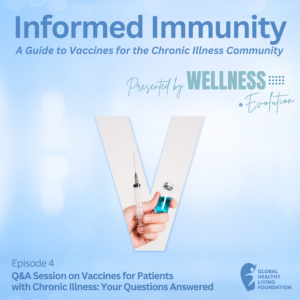
Ever felt overwhelmed by the sea of information — and myths — surrounding vaccines? In this Q&A, Dr. Hernandez and Angel Tapia tackle your burning questions about vaccines, from RSV to flu shots, pneumococcal diseases, and even COVID-19. Learn the importance of vaccines post-pandemic and the safety of multiple vaccinations. Tune in and empower your health knowledge.

Episode 4 - Q&A Session on Vaccines for Patients with Chronic Illness
Narrator 00:00
Be inspired, supported, and empowered. This is the Global Healthy Living Foundation Podcast Network.
Angel Tapia 00:11
Welcome to Informed Immunity, a wellness evolution podcast in which we tackle the crucial topics that impact community health, respiratory infectious diseases, vaccine advocacy, and more. I’m Angel Tapia, your guide into the world of community health and a Senior Manager of Hispanic Community Outreach at the Global Healthy Living Foundation. Joining me is my colleague, Dr. Daniel Hernandez, Director of Medical Affairs and Hispanic Outreach. Together, we’re here to break down complex health topics into easily understandable insights, answering the questions you’ve always had about vaccines, and more. Today, we’ll be answering questions from people all over the United States and Puerto Rico about RSV vaccines, flu vaccines, pneumococcal vaccines, and COVID-19 vaccines for people with chronic illnesses.
Dr. Daniel Hernandez 01:02
That’s right Angel. I’m excited to be here today to help answer the questions. Vaccines are one of the most important public health interventions in history, and it’s important more than ever to stay up to date on our vaccinations.
Angel Tapia 01:15
Perfect. Let’s get started with our first question. Why do I always feel like I get sick after a flu shot?
Dr. Daniel Hernandez 01:22
That is such a common statement that you get sick after a flu shot, it’s normal to feel a little under the weather after the flu shot. This is because the vaccine is causing your body to mount an immune response to the flu virus. The immune response can cause some of the same symptoms as a flu such as fatigue, headache, muscle aches, even a low grade fever, but these symptoms are usually mild and go away on their own within a few days. However, it’s important to note that flu shot cannot give you the flu that’s very, very important. The vaccine contains inactivated flu viruses, which means they cannot replicate and cause illness. If you are concerned about side effects of the flu shots, talk to your doctor. They can help you weigh the risks and benefits of the vaccine and decide if it’s right for you. Here’s some tips to help reduce the side effects of the flu shot. Get the flu shot in your non-dominant arm, so if you write right-handed and get the shot in your left hand, apply a warm compress to the injection site, drink plenty of fluid, get plenty of rest, and over the counter pain relievers such as ibuprofen or Tylenol can be used to relieve pain and fever.
Angel Tapia 02:36
Now on to our next question, what is RSV? And why should I get vaccinated against it?
Dr. Daniel Hernandez 02:42
RSV or respiratory syncytial virus is a common respiratory virus that usually causes mild cold-like symptoms. Most people recover in a week or two. But in infants and older adults and those with chronic conditions such as asthma, diabetes, rheumatoid arthritis, they’re more likely to develop severe RSV and need hospitalization. So there’s this vaccine, the RSV vaccine available to protect older adults from severe RSV. And it’s very important that if you do fall under categories that are at high risk for being affected with RSV, you get vaccinated.
Angel Tapia 03:26
Next question, what is the flu and why should I get vaccinated against it?
Dr. Daniel Hernandez 03:31
The flu is an influenza virus, right. And it’s a contagious respiratory illness. And what this means is it affects our respiratory system, it can cause mild to severe illness, and at times it can lead to hospitalization or death. And this is very serious. Not many people take this as serious as possible simply because we hear that the flu the season of zoom. Now, it’s not seasonal, actually it is throughout the year, but there are moments where it is more prevalent than others during the year. And just like we spoke about RSV, this can be very serious for certain people. So the best way to protect ourselves from the flu is with the flu vaccine. The flu can cause pneumonia, bronchitis and other complications that can lead to hospitalization. And if you already are suffering from a respiratory illness or condition which reduces your immune system, it’s very difficult to fight off this virus. The way that we can prevent that from happening is with a vaccine. If you have the vaccine, you have the antibodies you have this tool set within your body to fight the virus and to prevent more likely prevent you going to the hospital or having severe complications.
Angel Tapia 04:56
Next question. What are pneumococcal diseases and why should I get vaccinated against them?
Dr. Daniel Hernandez 05:02
You should care about pneumococcal diseases because they can be serious especially for young children, those with chronic conditions and older adults. Pneumococcal diseases can cause a variety of infections including pneumonia, meningitis, ear infection, so blood disease as well. Pneumonia is an infection of the lungs is a leading cause of death from an infectious disease in children under the age of five. It can also be serious for adults, especially those who have chronic medical conditions or weakened immune systems. Meningitis is an inflammation of the lining around the brain and spinal cord. So pneumococcal diseases can cause meningitis, and it can lead to a serious infection that can lead to brain damage, hearing loss, and even death. The way that we can prevent this is through the pneumococcal vaccine, which is safe and effective for people of all ages, the CDC recommends that all children get vaccinated against pneumococcal diseases and the CDC also recommends that adults 65 years of age and older get vaccinated against pneumococcal diseases. As I mentioned, it’s very serious, and it can even lead to death. It can also be very costly, both in terms of medical bills and can’t go to your job, you end up hospitalized. So it’s so easy to prevent this simply go to your doctor, you get a vaccine, you build this immune system against pneumococcal diseases, and you’re good to go. So it’s something that we have to take seriously and be proactive of defending ourselves against.
Angel Tapia 06:41
Thank you, Daniel, for all of that detail. I want to move to our next question that we received, which is COVID-19 pandemic is over, why should I get vaccinated for something that I need to get tested to know if I have in the first place?
Dr. Daniel Hernandez 06:54
Vaccines are the best way to protect yourself and your community from COVID-19 that are safe, effective and widely available, we have to remember that COVID-19 is still a serious threat. Even if the pandemic is over, the virus is still circulating, new virus can emerge at anytime, and vaccines can help to protect you from serious illness, hospitalization, and death, even from new variants. It’s not just that it also protects those around us. So if you don’t have a chronic disease, or if you’re not elderly or a child, it doesn’t matter because the vaccination will not only protect yourself, but it will protect those around you. It’s important to note that COVID-19 can have long term health consequences as well. Even people who have mild cases of COVID-19 can later develop long COVID. We’ve heard about it and it’s very true, a condition that causes a variety of symptoms, including fatigue, shortness of breath, brain fog, chest pain, it can even lead to the reduction or complete elimination of your smell, or taste sensors. So all of these are very, very important to keep in mind. A long COVID can last for months or even years and vaccination can reduce your risk of developing lung COVID. Vaccines are very simple and effective ways to protect yourself and your community from COVID-19. And it’s also a way to not only like I mentioned, protect yourself, but also those around you.
Angel Tapia 08:28
Thank you so much for sharing that personal information. And one of the other questions that we received is who should get vaccinated against COVID-19?
Dr. Daniel Hernandez 08:38
This is an easy one. The CDC recommends that everyone six months of age and older get vaccinated against COVID-19. This is especially important for people with chronic illnesses, pregnant women, and healthcare workers.
Angel Tapia 08:50
On to our next question, can I get vaccinated against RSV, the flu, pneumococcal diseases, and COVID-19 all at the same time?
Dr. Daniel Hernandez 09:00
Yes, you can get vaccinated against RSV, the flu, pneumococcal diseases, and COVID-19 all at the same time. There’s no evidence that getting multiple vaccines at the same time is any less safe or effective than getting them one at a time. In fact, getting multiple vaccines at the same time can be more convenient and can help you stay up to date on all of your vaccinations.
Angel Tapia 09:21
And now on to our last question. What if I have a chronic illness? Should I still get vaccinated against RSV, the flu, pneumococcal diseases, and COVID-19?
Dr. Daniel Hernandez 09:33
Definitely. People with chronic illnesses should still get vaccinated against all of them. In fact, people with chronic illnesses are at higher risk of serious complications from these illnesses. So it’s especially important for them to get vaccinated. Vaccines are safe and effective for people with chronic illnesses. The CDC recommends that all adults with chronic illnesses get vaccinated against the flu and pneumococcal diseases, adults with chronic illnesses who are at high risk of getting RSV may also want to consider getting vaccinated against RSV. And if you have a chronic illness and you’re not sure whether you should get vaccinated against these, talk to your doctor, they can help you to assess your individual risk and make the best decision for your health. Here’s some benefits of getting vaccinated against these. They can protect you from serious illnesses, hospitalization and death, they can reduce the risk of complication from these illnesses. Vaccines can help to improve your quality of life and vaccines can help to protect your loved ones from getting sick. So remember, getting vaccine is something that is convenient. That is something that you can do proactively against getting infected from these viruses and not having serious complications, as well as helping those around you be safe.
Angel Tapia 10:48
Thank you so much, Daniel for answering the questions and providing your insight and research on these topics. And before we go, as we’ve done in each episode, why don’t we offer our listeners a refresher on vaccines, a vaccine 101, so to speak, let’s start with what are vaccines?
Dr. Daniel Hernandez 11:06
Vaccines teach your body how to produce antibodies against the virus you’re being vaccinated for. This helps protect you from infection in the short term. Vaccines also help train other immune cells known as B cells and T cells. T cells recognize when a pathogen enters the body and attacks infected cells, and B cells produce antibodies that directly interact with the pathogen to neutralize they have something like a memory that allows them to identify and respond every time a given pathogen enters the body.
Angel Tapia 11:39
And can you tell us what role boosters play in immunity?
Dr. Daniel Hernandez 11:43
Boosters, or additional doses of any vaccine provoke an immune response and further strengthen your immune system, both in the short term and the long term. That is why doses are spaced apart. They help reactivate and strengthen the immune response for the short term and also the long term.
Angel Tapia 12:02
And can you shed some light on why some people do you have side effects?
Dr. Daniel Hernandez 12:07
Sure. So vaccines induce an immune response because they introduce sometimes a part of the virus, but also sometimes just a little bit of an instruction of how to fight this virus. It is a bit of a virus, it’s not enough to fully infect you with a disease. But many people might have some side effects and response to the vaccine because the immune system is learning how to fight it off, and it is finding it off in a very minor way. So the most important thing to remember is that the vaccine cannot give you the disease you’re being vaccinated against, you might get some pain and redness at the injection site, some fatigue, fever, headache, but these should go away in a few days. If they haven’t gotten in a few days, it’s very important to speak to your physician. And also something to note is if you get a vaccine, you should they in the clinic or wherever you’re getting your vaccination on site for around 15 minutes afterwards, just in case of an allergic reaction. Allergic reactions are very rare. But it’s important to make sure that you’re not one of the people that are allergic to a specific vaccine. And if you are, you’re in the right place in order for the correct intervention to happen quickly.
Angel Tapia 13:23
Thank you for all of this information, Daniel. It never hurts to have a refresher and remind ourselves of the importance of our vaccines. And for more information, listeners can visit the CDC or WHO websites for more evidence based information. Thank you for tuning in. And until next time, stay informed and stay healthy. Thank you for joining us on this episode of Informed Immunity, a wellness evolution podcast. We hope our discussions inspire meaningful conversations with your loved ones. For Spanish speaking listeners episodes are also available in Espanol. If you have any questions or topics you’d like us to address, email us at [email protected] and you can find all of GHLF’s podcasts at ghlf.org/listen, if you like this podcast, give us a rating and write a review on Apple podcasts and subscribe to us. Wherever you listen. It’ll help more people like you find us. I’m Angel Tapia,
Dr. Daniel Hernandez 14:26
and I’m Dr. Daniel Hernandez
Angel Tapia 14:28
Until next time, stay informed and stay safe.
Narrator 14:32
Be inspired, supported, and empowered. This is the Global Healthy Living Foundation Podcast Network.
MORE RESOURCES
GHLF is dedicated to promoting accurate, evidence-based insights on vaccines and vaccine research. We consistently provide resources that highlight the importance of vaccines, including the COVID-19 vaccine. Additionally, we advocate for collaborative decision-making between patients and health care providers while creating content tailored to both patients and policymakers.
MEET OUR HOSTS


Daniel Hernandez, MD
Director of Medical Affairs and Hispanic Outreach
Daniel Hernandez, MD, leads our medical team of consulting physicians as well as Hispanic outreach across all disease states and countries. Daniel was born in El Paso, Texas. He graduated with a Biology degree from the University of Texas at San Antonio, received his MD from the Universidad Autonoma de Guadalajara, and co-founded the International Medical Graduate section of the National Hispanic Medical Association.
Angel Tapia
Senior Patient Advocate, Hispanic Community Outreach Manager
Angel Tapia is a patient advocate that works in outreach to our Hispanic community. Angel helps support research and education projects and assist with the translation of services. Angel also helps manage social media platforms such as LinkedIn and the soon to be launched Facebook Español. She is one of the newest staff members and has been with GHLF since October of 2020.
Subscribe for More Resources
By subscribing, you agree to receive emails from The Global Healthy Living Foundation. We will never sell your data. See our Privacy Policy.

![logo_GHLF_FULL white[61]](https://ghlf.org/wp-content/uploads/2023/10/logo_GHLF_FULL-white61.png)

Informed Immunity is a new podcast series produced by the non-profit Global Healthy Living Foundation, and made possible with support from GSK and BMS.



